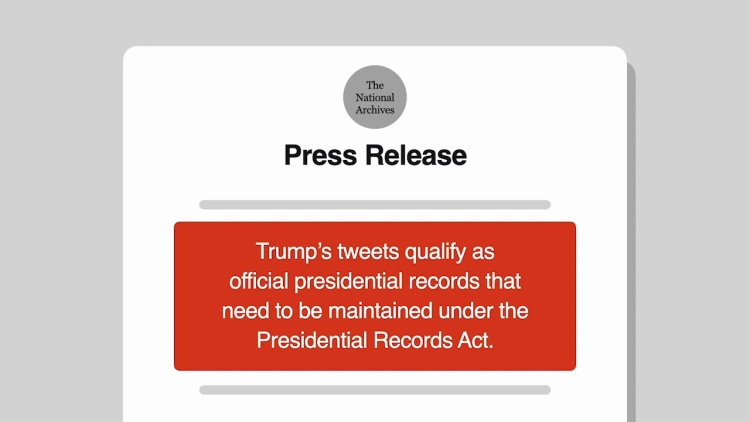Knight First Amendment Institute at Columbia v. Trump
United States Court of Appeals for the Second Circuit
928 F.3d 226 (2019)
- Written by Rose VanHofwegen, JD
Facts
Donald Trump (defendant) had a Twitter account before becoming president. After his inauguration, he used that account to communicate and interact with the public as president. The account and associated web page appeared official, the White House director of social media helped Trump operate the account, and White House officials described Trump’s tweets as “official statements by the President.” Trump also used his Twitter account to conduct official business, such as announcing administration staff and major policy changes and communicating with foreign officials. The National Archives concluded that Trump’s tweets qualified as official records belonging to the public, which must be maintained under federal law. In 2017 Trump blocked some Twitter users (coplaintiffs) who posted replies that criticized him or his policies from the account. Blocked users could not see Trump’s tweets once logged in, post replies, or participate in discussion threads on the associated web page. Blocked users could arguably create new accounts or use workarounds to see Trump’s tweets and post comments on their own timelines, but it was more difficult to contribute and participate. The Knight First Amendment Institute at Columbia (coplaintiff) and blocked users sued, asserting that Trump engaged in unconstitutional viewpoint-based discrimination by blocking users who disagreed with him. After the federal judge declared Trump’s conduct unconstitutional, Trump appealed.
Rule of Law
Issue
Holding and Reasoning (Parker, J.)
What to do next…
Here's why 899,000 law students have relied on our case briefs:
- Written by law professors and practitioners, not other law students. 47,000 briefs, keyed to 994 casebooks. Top-notch customer support.
- The right amount of information, includes the facts, issues, rule of law, holding and reasoning, and any concurrences and dissents.
- Access in your classes, works on your mobile and tablet. Massive library of related video lessons and high quality multiple-choice questions.
- Easy to use, uniform format for every case brief. Written in plain English, not in legalese. Our briefs summarize and simplify; they don’t just repeat the court’s language.





